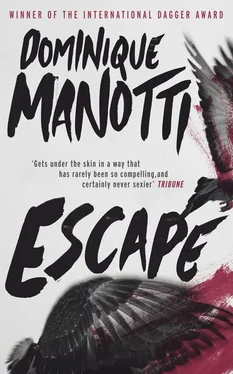Dominique Manotti - Escape
Здесь есть возможность читать онлайн «Dominique Manotti - Escape» весь текст электронной книги совершенно бесплатно (целиком полную версию без сокращений). В некоторых случаях можно слушать аудио, скачать через торрент в формате fb2 и присутствует краткое содержание. Год выпуска: 2014, ISBN: 2014, Издательство: Arcadia Books Limited, Жанр: Криминальный детектив, на английском языке. Описание произведения, (предисловие) а так же отзывы посетителей доступны на портале библиотеки ЛибКат.
- Название:Escape
- Автор:
- Издательство:Arcadia Books Limited
- Жанр:
- Год:2014
- ISBN:9781909807747
- Рейтинг книги:4 / 5. Голосов: 1
-
Избранное:Добавить в избранное
- Отзывы:
-
Ваша оценка:
- 80
- 1
- 2
- 3
- 4
- 5
Escape: краткое содержание, описание и аннотация
Предлагаем к чтению аннотацию, описание, краткое содержание или предисловие (зависит от того, что написал сам автор книги «Escape»). Если вы не нашли необходимую информацию о книге — напишите в комментариях, мы постараемся отыскать её.
Escape — читать онлайн бесплатно полную книгу (весь текст) целиком
Ниже представлен текст книги, разбитый по страницам. Система сохранения места последней прочитанной страницы, позволяет с удобством читать онлайн бесплатно книгу «Escape», без необходимости каждый раз заново искать на чём Вы остановились. Поставьте закладку, и сможете в любой момент перейти на страницу, на которой закончили чтение.
Интервал:
Закладка:
‘We hadn’t expected you to be in the bin room…’
‘I had no choice. I’m always there at that time. The truck was late, it arrived while I was cleaning. I was surprised, because it’s never happened before.’
‘…and certainly not that you would jump into the skip.’
‘I didn’t think. I saw you and just followed.’
‘What are you going to do now?’
‘Stay with you. Can’t I?’
‘No.’
‘Then I have no idea.’
‘We part company here.’ He places a canvas bag at Filippo’s feet. ‘I’ve put everything I could find in the cars in there for you. Clothes, two sandwiches, and some money.’ Carlo pauses, Filippo says nothing. ‘My escape will be in the news, I think. And they’ll be looking for you, because you broke out with me. You’ll have to keep a low profile for a while, until things settle down.’ A pause, Filippo still saying nothing. ‘Do you understand what I’m telling you?’
A nod. Filippo continues to gaze at the mountains.
‘If things get too tough here in Italy, go over to France. Here, on this envelope, I’ve written the address of Lisa Biaggi, in Paris. Go there and say I sent you, tell her what happened. She’ll help you.’ Filippo takes the envelope without looking at Carlo and slips it in the bag. Carlo stands up.
‘Goodbye, Filippo. Take care of yourself.’
And he leaves, walking fast and without turning round.
A little later Filippo hears the sound of an engine coming from behind the ruined barn. He sits rigid for what feels like ages. Then he sees a car driving alongside the lake, down below. It looks tiny, out of place in this wilderness. Carlo is inside, for sure. The car disappears behind the rocky ridge. Agony. The sun is setting behind Filippo and the rock face opposite turns pink, then grey. It is dark. Filippo is exhausted. He feels bereft, lost, helpless. Orphaned. Unable to pursue a coherent train of thought, he simply lets time flow past. When he starts to shiver with cold, he gets up, returns to the dilapidated barn and finds the car that brought them there, hidden under a half-collapsed roof. He lifts the bonnet — the spark plugs have been removed and wires ripped out. He slides under the rear seat, wraps himself in a blanket lying on the floor and falls asleep, his head resting on the canvas bag.
When he wakens, the sun has just risen behind the white rocks. The light is sharp, pitiless. Filippo changes into clean clothes. He feels relaxed. He goes out and sits facing the sun, slowly eating a sandwich and drinking some fresh water. Where the hell am I? Lost. Jumping into that skip was a bad move. Serves me right. I thought that my cellmate — working-class and proud of it, a political prisoner, educated, a smooth talker and avid reader — was my friend, a friend to the street kid who can barely read, incapable of stringing together three sentences. Idiot. In your dreams. Dumped like a girl. Bitterness and resentment. OK, so I don’t know where I am, but do I know where I’m going? A vision of the car, the previous evening, driving away along the lakeshore. I know where I’m heading, the exit’s that way. Then what? Rome? My family? I’ve slammed the door, I’m not going home a loser. And the cops will get there before me. Go back to my Termini station gang, back to fleecing tourists and selling contraband cigarettes? Endlessly fighting over cash, a girl, a carton of fags, the cops who’ll pay off anyone willing to snitch on their mates, sit next to the guy who might have been the one who grassed on me and shake his hand. The filth, the violence, permanently stoned. I’ve had enough. When I was inside, I dreamed of something different.
They used to sit side by side on the narrow lower bunk, passing a joint back and forth cupped in their palms, and Carlo would talk nonstop, very quietly in the dark, occasionally punctuated by desperate howls, muffled thumping on the walls, the screws on their rounds. He recounted his memories to Filippo, at first grim, of going to work in the Milan factories as a very young man, bewildered by the brutality of a factory worker’s life. Then, very soon, the workers’ protests of the late sixties began. Carlo told him about the meetings in his workshop, in his factory, which soon became a daily event. Each person took the floor, and each person’s view was given equal weight. There was an initial forging of collective thinking and a collective will. Carlo would grow excited as he recalled the euphoria of discovering the strength of men acting in unison, all equal, of workers’ marches through the factory that started spontaneously after the meetings, going from workshop to workshop, discovering a world that, until then, had been mysterious and threatening, where the men were not permitted to move around freely. In a great burst of elation, solidarity and hope, they had believed that the factory belonged to them, that it had become their territory. He and his comrades, along with so many others, had tied red scarves around their necks to demonstrate their pride and their determination. They had driven out the hated bosses, had begun to reorganise their workload and the production process. Carlo still talked about the outbursts of wild joy, like that night in Milan when he and his friends set fire to all the bosses’ cars at the same time. It made for an enthralling fireworks display and was a way of taking power over the city, a sacred revenge. It hadn’t lasted long, but to experience that, at least once in a lifetime … Filippo listened, rapt. He felt every word resonate in his body. The factory had never been what he wanted, working as slave labour, for so little return. But the tightly knit group, standing together for better or for worse, collective struggle and violence as a way of life, the hope of overturning everything one day — that was something he had always dreamed of. Among Rome’s street gangs, he had never found more than a distant, distorted echo of his dreams and his desperation, the battle for survival of all against all, without ever having the words to express it.
Today he could see it all very clearly; he envied Carlo and the Milan workers.
Carlo went on, ‘The old world was fracturing, it was the dawn of a new era, but we couldn’t find the right words to describe the world we were in the process of inventing, and to carry an entire people along with us. We spoke a turgid, outdated language, one we had inherited, the language of the old world that we wanted to bury. Naturally, no one understood us, any better than I think we did ourselves. If only there’d been a modern Victor Hugo in our factories to tell our story, just think … our fate might have been different. Who knows? There are moments like that when worlds can be turned upside down.’ And on that note he fell silent, absorbed in his memories and his dreams. Filippo, sitting beside him in the dark, feeling the warmth of his body, carried on listening to his silences, moved to tears, without trying to understand why. Victor Hugo, no, he couldn’t think like that. He didn’t know who Hugo was, but he told himself that one day, perhaps, he would.
Carlo resumed, on a more sombre, despairing note, ‘History very soon abandoned us, we’d probably got it all wrong, probably realised too late. The bosses reshaped the economic order. A globalised market — that was the watchword. It felt as though the factory, our world, the only world we knew, the focus of all our struggles, our pride and even our lives, was slipping through our fingers. Plants were relocated, we didn’t know where, the machinery changed, and with it, the way production was organised. Power was vested in the white-collar workers, the teams of shop-floor workers were broken up, we felt the need to expand the battlefield, come out of the factory so we weren’t suffocated to death inside. In December ’69, the henchmen of the neo-fascists, the Italian secret service and the CIA, exploded a bomb in a Milan bank, Piazza Fontana. It left seventeen dead, dozens injured. Do you remember, Filippo?’
Читать дальшеИнтервал:
Закладка:
Похожие книги на «Escape»
Представляем Вашему вниманию похожие книги на «Escape» списком для выбора. Мы отобрали схожую по названию и смыслу литературу в надежде предоставить читателям больше вариантов отыскать новые, интересные, ещё непрочитанные произведения.
Обсуждение, отзывы о книге «Escape» и просто собственные мнения читателей. Оставьте ваши комментарии, напишите, что Вы думаете о произведении, его смысле или главных героях. Укажите что конкретно понравилось, а что нет, и почему Вы так считаете.












